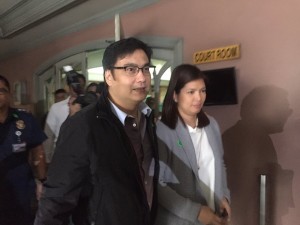The Commission on Elections (Comelec) may be facing a crisis: Three of its seven commissioners will end their terms a few months before the 2022 presidential elections, leaving the election agency seriously undermanned before the presidential vote.
“Ito ang problema (This is the problem)…There are three members of the commission whose terms are expiring February 2022 and May 2022 is a presidential election,” Comelec chair Andres Bautista told INQ&A on Tuesday.
The three commissioners set to step down on Feb. 2, 2022 are Bautista, Maria Rowena Guanzon and Sheriff Abas.
Bautista said it would be crucial for the Comelec to have a “full commission overseeing and supervising the election.”
“There has to be a fix. And it has to be a constitutional fix,” he said, explaining that an early resignation would not resolve the problem.
“We are looking to amending the Constitution,” he said.
Under the 1987 Philippine Constitution, “Appointment to any vacancy shall be only for the unexpired term of the predecessor.”
This means that if Bautista resigns at an earlier date, his replacement will still have to step down in February 2022.
Why me?
Bautista, who made headlines after the National Privacy Commission (NPC) recommended that he be charged for the so-called “Comeleak,” said the commission would soon be filing a motion for reconsideration.
The NPC recently ruled that Bautista was criminally liable for the “Comeleak” or the hacking of the Comelec website, which resulted in the posting of voters’ data online.
Almost 77 million voter registration records, which included passport details and addresses, were exposed by the breach.
“Bakit naman may recommendation ng criminal liability? Kami ang victim dito (Why is there a recommendation for criminal liability? We are the victims here),” he said.
“Instead of apprehending the hackers, it is like they are punishing the agency that was hacked,” he said.
The hacking of the Comelec website and the subsequent posting of voters’ details online has been described as one of the worst breaches of a government-controlled database.
The NPC, in its ruling, said Bautista was criminally liable and had violated provisions of the Data Privacy Act.
Bautista, during the INQ&A interview, questioned this, saying he was being singled out.
“The appointment of a data protection officer… that I cannot do alone. I have to do that with the other members of the commission,” he said.
“I do not understand why I alone am being accused. They did not think there was negligence on the performance of the IT (division),” he pointed out.
Bautista also criticized the NPC for its assertion that the Commission should have been implementing certain privacy or security standards based on the Data Privacy Act.
“Under the Data privacy Act of 2012, the privacy commission was supposed to come up with their implementing rules and regulations (IRR) within 90 days from the time the act was passed,” he said. “Of course you cannot blame them because there was nobody appointed to the National Privacy Commission until March 2016, which was more than 3 years since the law was passed.”
The IRR was only promulgated in August 2016, months after the Comelec website was hacked.
“It’s like it’s being given retroactive effect,” he said.
The Comelec chair also argued that several other government agencies have been hacked in the past. “Have they investigated these hackings?”
Nevertheless, Bautista said the Comelec en banc already agreed to follow the recommendations of the NPC. They have already identified an acting data protection officer.
He also promised to share with the public the results of the agency’s assessment on the data breach.
INQ&A is a weekly interview show of INQUIRER.net, aired live during Tuesday at 8 p.m. via Radyo Inquirer 990AM, Inquirer 990 Television and Facebook. CBB/rga
